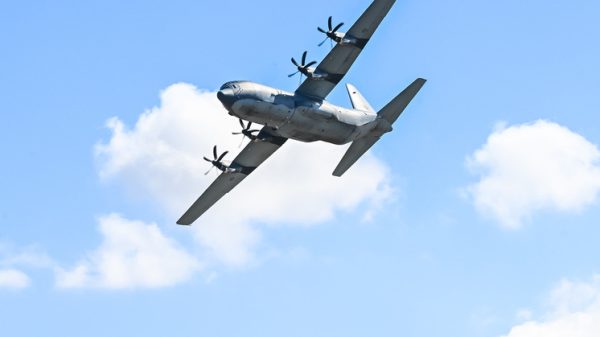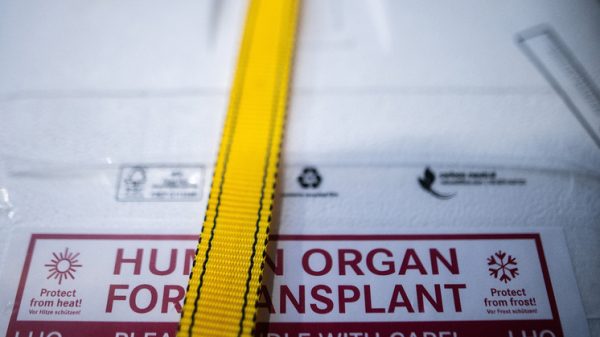 The European Commission plans to limit EU countries from purchasing weapons from British firms. Photo: Leon Neil/Getty Images < p>The European Union could block arms exports to Britain if war breaks out with Russia, it was announced on Tuesday.
The European Commission plans to limit EU countries from purchasing weapons from British firms. Photo: Leon Neil/Getty Images < p>The European Union could block arms exports to Britain if war breaks out with Russia, it was announced on Tuesday.
A senior official said plans had been drawn up to prevent overseas arms transfers and civil technologies. to compensate for the bloc’s own shortcomings in the “security crisis.”
“To counter the resumption of high-intensity warfare on our border, we have decided to accelerate,” Thierry Breton, the EU industrial commissioner told reporters as he announced plans to transform the bloc's defense industry onto a military footing.
The proposed reform is part of a broader strategy to bolster European military support for war-torn Ukraine and prepare for the growing threat posed by Vladimir Putin's Russia.
Brussels wants to significantly increase joint production and procurement of weapons among its countries. The 27 member states are seeking to strengthen the continent's security and reduce dependence on the US.
The European Commission is calling for new powers to control military exports from the bloc to secure its capitals in case the war in Ukraine spreads beyond its borders .
 British soldiers drive Jackal vehicles during a NATO exercise in Poland on Monday Photo: Kacper Pempel/Reuters
British soldiers drive Jackal vehicles during a NATO exercise in Poland on Monday Photo: Kacper Pempel/Reuters  to significantly increase joint production and procurement of weapons among 27 member states. Photo: Kacper Pempel/Reuters
to significantly increase joint production and procurement of weapons among 27 member states. Photo: Kacper Pempel/Reuters
Mr Breton said: “The European Defense Investment Program includes measures to set priorities.
“EDIP contains a comprehensive security of supply framework, which is built into it in case of crises situations.»
“Once this stage is declared, specific measures may be applied, including priority orders for civilian products or defense products depending on the situation.”
About 40 percent of the weapons and ammunition currently produced in the bloc are shipped abroad, said Josep Borrell, the EU's chief foreign diplomat, outlining the scope of a potential export blockade.
“We have a strong defense industry because we export a lot,” he added. “Of course, when demand increases greatly, which can happen in the event of war, we must ask for additional contributions.”
Member states will have to vote on the crisis situation, including security issues and more. general shortage of weapons before the export ban was introduced.
The measure is reminiscent of export controls imposed by the EU on vaccine supplies at the height of the coronavirus pandemic, which sparked a war with Britain.
Although the EU has promised to «join together with like-minded strategic partners» and international partners, the UK is excluded from any of its new schemes to increase defense production.
Ukraine will be treated as a «quasi-member state» as Brussels tries to compensate for its recent failure to provide Kyiv with a million artillery shells.
The scheme will also restrict EU countries from buying weapons from British firms such as BAE Systems if they want to take advantage of financial incentives paid out of the bloc's budget.
 British defense contractor BAE Systems' facility in Rochester. Photo: Heathcliff O'Malley for The Telegraph
British defense contractor BAE Systems' facility in Rochester. Photo: Heathcliff O'Malley for The Telegraph The UK is excluded from any of the new EU schemes to boost defense production. Photo: Daniel Karmann/Avalon
EU members have spent more than 100 billion euros on defense procurement since Russia's invasion of Ukraine, said Margrethe Vestager, vice-president of the commission.
“Almost 80 percent of this amount has been spent outside the European Union. and the United States alone accounted for more than 60 percent of this spending. This is no longer sustainable,” she said.
The strategy aims for domestic arms trade within the bloc to reach 35 percent of the total value of its defense market by 2030.
National capitals will also be asked to purchase European weapons worth at least 50 percent of their own defense budgets over the same period, rising to 60 percent by 2035.
Initial fund of 1.5 billion euro allocated. provide incentives, including tax breaks, to firms and governments supporting joint European procurement.
Mr Breton has previously said the amount must rise to at least 100 billion euros for the bloc to surpass Washington. and the US defense industry.






















































Свежие комментарии